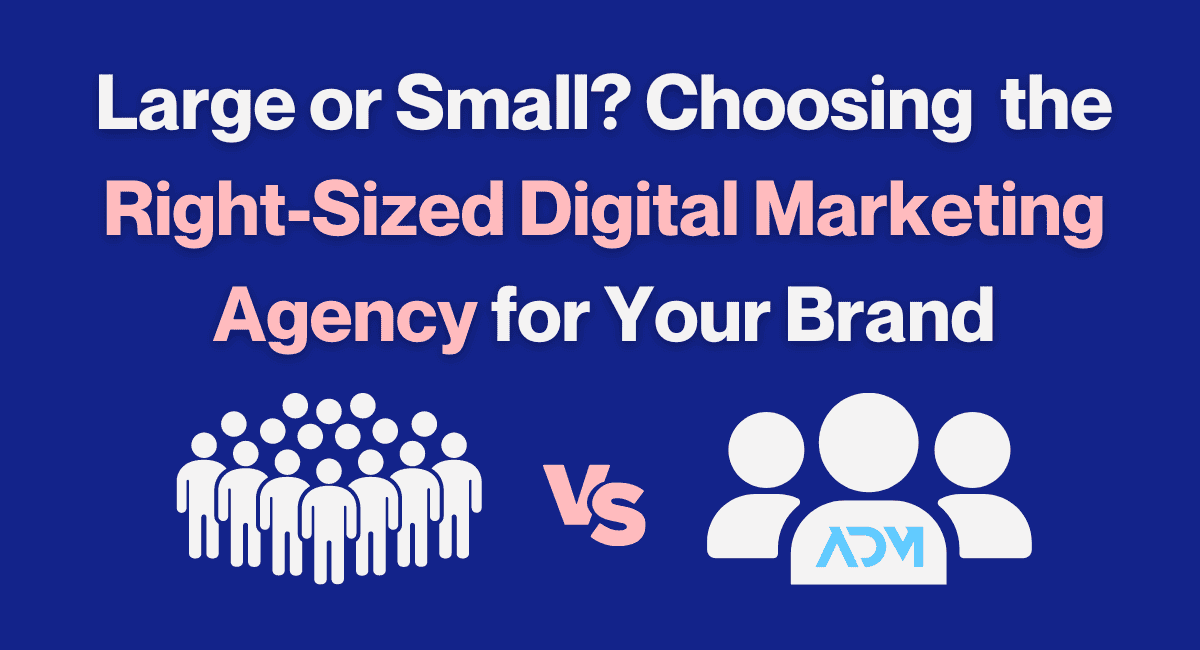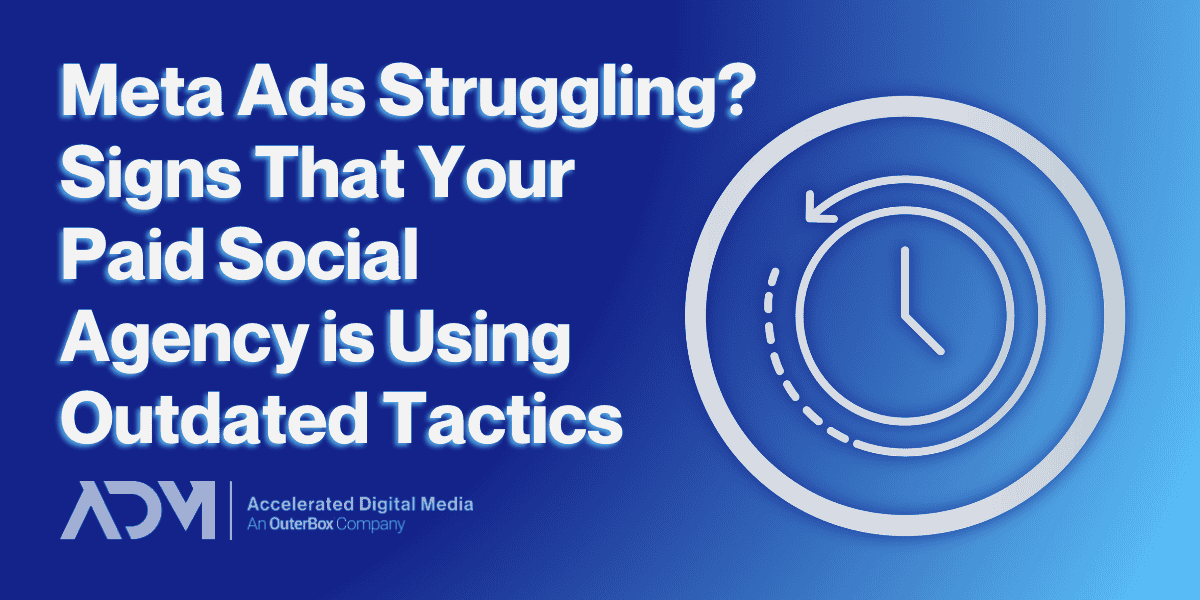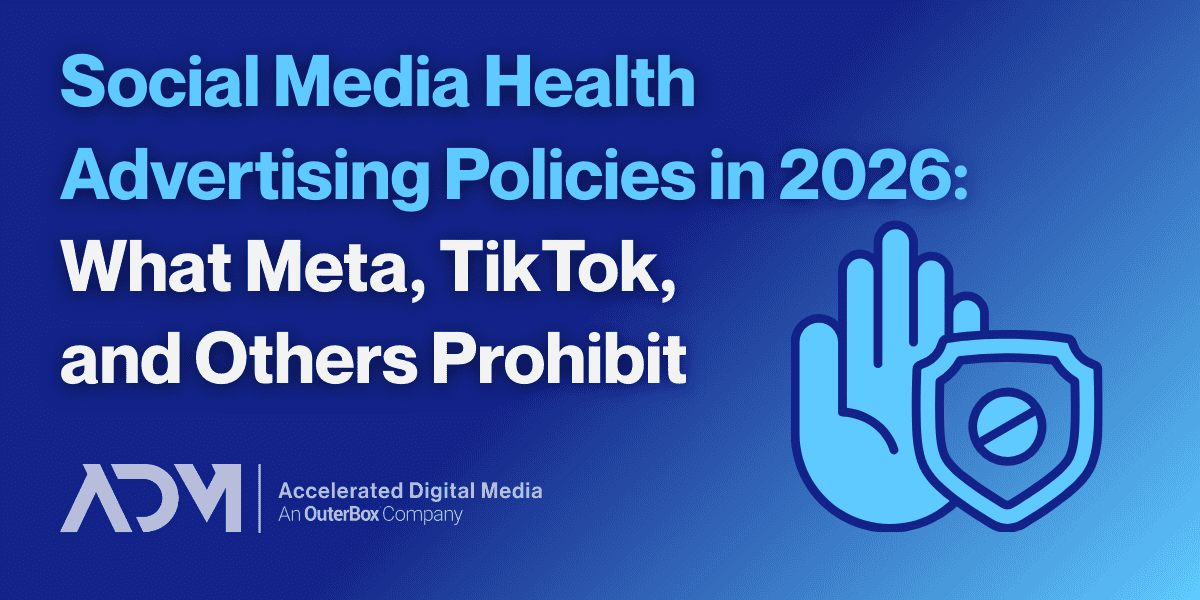When choosing a digital marketing agency, there is a vast array of options that brands must consider: Track record, company culture, strengths, and expertise are included. But one major, basic factor to consider at the very beginning is the size of the agency itself.
Large agencies offer vast resources and extensive networks, while smaller boutique firms like ADM emphasize personalized service and agility. Here, we’ll delve into what differentiates large agencies from smaller ones and highlight what advantages each offers for different companies. To write this piece, we spoke to ADM employees who have previously worked for larger agencies. We anonymized names to elicit honest answers.
Defining “Large” vs. “Small” Digital Marketing Agencies
Large Agencies
When we speak about “large” agencies in this context, we’re talking about agencies that number in the high hundreds or many thousands of employees. For the most part, agencies of that scale are part of much larger organizations.
“When you work for an agency that’s part of a holding company, you are really a part of a much more sizable organization than just your one agency—which is, on its own, typically quite sizable. Processes, team setups, raise cycles, clients you work with, and the resources allotted to employees all reflect this,” according to a senior ADM employee with past experience working in larger agencies.
Examples include WPP PLC (with agencies like Ogilvy and Grey), Omnicom Group Inc. (featuring BBDO and TBWA), and Publicis Groupe (home to Leo Burnett and Saatchi). These organizations are known for their comprehensive resources, specialized teams, and well-established processes.
Small Agencies
“While some independent agencies are larger, they still appear small compared to the vast scale of holding companies,” the senior employee explained. The largest independent agencies might employ up to 1,500 people, but this is a fraction of the workforce in the major holding companies, which can number between 60,000 and 100,000 employees.
With that in mind, we’re defining “small” digital marketing agencies for the purposes of this blog as independent teams up to a few hundred employees—but often as small as a few dozen.
Advantages of Large Digital Marketing Agencies
Extensive Resources and Specialization
Large marketing agencies often excel at providing extensive resources and specialized services. With a broad array of departments and teams, they can address a wide array of complex needs. That’s enterprise-level companies with major budgets are often attracted to bigger agencies. “One person doesn’t have to be everything and it means that you have a team to rely on for most things,” one of our employees said.
Processes and Scalability
Larger agencies offer well-defined processes and scalability. Their established systems are there to emphasize efficiency for large projects. Those structured approaches to campaign management and project execution are often supported by a robust infrastructure—so there isn’t a risk of “tapping out” the agency’s capabilities for its largest clients.
Brand Reputation and Network
“Brand power is a thing,” one of our employees said. Working with a large agency often means leveraging a strong brand reputation and extensive network. This can provide clients with added prestige and access to high-level industry connections. Large digital marketing agencies typically have established relationships with media outlets and technology providers, creating additional partnership opportunities.
Disadvantages of Large Agencies
Less-Personalized Service
One significant drawback of large agencies is the potential for less personalized service. With many layers of management and extensive client rosters, clients may find themselves dealing with less experienced staff or encountering a lack of continuity.
“Oftentimes, the most junior individuals were the ones working on accounts,” one of ADM’s ex-large agency employees observed. This can result in a disconnect between the client’s needs and the day-to-day management of their account.
Slow Response and Bureaucracy
Our team members who had previously been at large agencies touched on the problems that bureaucracy can create—namely slower response times. With multiple layers of approval and complex organizational structures, decision-making can be sluggish.
This can be frustrating for clients who need rapid adjustments or innovative solutions. As our team noted, at large agencies there are often delays due to the need to navigate through various approval processes and layers of management.
High Employee Turnover
Anywhere there are a lot of employees, there’s a chance for a lot of turnover—and that’s especially true in marketing agencies.
“From the lens of an employee: You are siloed. You work exclusively on the area you were hired to do,” one of our employees said. That can breed stagnation.
“In my experience, top performers often looked elsewhere for advancement, which can lead to disruptions in service continuity,” another of our employees responded. As talented account managers and strategists move on or seek growth opportunities elsewhere, clients may experience frequent changes in their service team. That turnover can impact the quality and consistency of client service.
Oversight Deficiencies
In addition to the potential for turnover, it’s often difficult to keep track of every employee in a very large organization—meaning there’s often a high degree of variance in employee capability.
“Large agencies might be so big that they struggle with proper oversight of employee onboarding, leading to potential inconsistencies in client service,” another ADM employee with firsthand experience explained.
Advantages of Small Agencies
Personalized Service and Collaboration
One of the key benefits that smaller agencies can provide is personalized service. Employees often work closer with clients and develop direct relationships, so clients have better access to experienced professionals who are deeply invested in their success. This approach can produce longer agency-client relationships—in ADM’s case, our average client relationship is about three years, and often much longer.
“We foster strong partnerships and maintain open lines of communication,” one ADM expert said. This collaborative approach ensures that clients feel involved and valued throughout the process.
Flexibility and Agility
“Smaller agencies can be more responsive and adapt swiftly to shifting priorities,” a senior team member notes. Smaller agencies are known for their flexibility and agility. This agility is crucial for clients who need to pivot strategies or address emerging challenges promptly. At ADM, our response times are often as low as 15 minutes because there are no bureaucratic layers between employees and clients.
Innovative and Creative Solutions
At small agencies, custom solutions are more common: There are fewer cookie-cutter formulas placed on client accounts. Without the constraints of extensive bureaucratic processes, smaller agencies can offer innovative and creative solutions. At ADM, that allows us to implement new tools and strategies quickly without waiting for approval from multiple executives. This ability to move swiftly and think outside the box enables us to deliver fresh and effective solutions tailored to our clients’ needs.
Cost-Effectiveness
Smaller agencies often have lower overhead costs, which can translate into more competitive pricing for their services. “We provide high-quality strategy and execution equivalent to big agencies but at a fraction of the cost,” Eric says. This cost-effectiveness allows clients to access premium services without the hefty price tag.
Employee Culture
At the end of the day, the quality of work that a digital marketing agency can provide is going to be highly dependent on the engagement of the employees doing the work. A small, close-knit team can provide better support and address employee needs directly, leading to less of the stagnation, frustration and turnover our employees expressed witnessing when they worked at larger firms.
Deciding if Our Agency is the Right Fit
While there are advantages to both large and small digital marketing agencies, we’re clearly going to be biased as a smaller one. When speaking with our staff about their past experiences at big-box marketing agencies, they did not hesitate to point out some advantages—but also some major disadvantages, and all the ways that they felt a smaller team managed to avoid them.
Ultimately, the right decision is the one that best benefits your business and its marketing goals. If you’re looking for a nimble, close-knit agency with a proven track record of driving growth for major clients, we’d encourage you to reach out to our team for a conversation or a full digital marketing audit.



